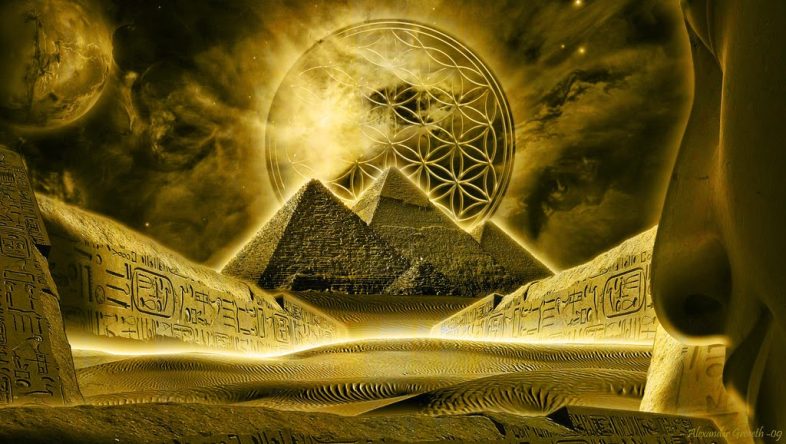Gods move along with the men serving them and they grow together as the communities that adopted them grow. The group that needed a god became a clan, the clan a tribe, the tribe a nation, the nation a multi-nation kingdom then an empire.
From being the protector of the clan in a small encampment gods become the protectors of walled cities and the lands controlled by men of the walled cities. Along with the soldiers of the invading armies the soldiers of the gods go and implant their little shrines. With time the shrines become temples and temples a complex of buildings with many gods.
Like tribal chieftains and kings, gods mature with time and they take up the ranks of men who serve them and those who elevate them to elevate themselves with them. Following the structure of the state of walled cities, gods are appointed to rule the sky, the countryside, the sea, the ocean, the wind, the ground and the underground. Civilisations thrived in walled cities with discipline, innovation, creativity, arts, philosophy and humanities. Each branch may have a god and a god may be assigned to contrasts such as belief and reason.
Men who rule the city would want to rule the country, the other countries around it and the world. Gods become as ambitious as the kings. They would have assemblies, and like men, they may quarrel and fight over power or beautiful girls of earthlings. And like the man who becomes king of kings and emperor of emperors, a god may become the king of all gods. He will rule the heaven and earth supreme. He can send people to their death and resurrect them, be compassionate and ruthless, bring prosperity and abundance and poverty and famines.
Men and women worship the gods but no two believers worship the same. The qualities and attributes of the gods can be understood differently. These can be many. Some worshippers may like the gods because they are merciful, others because they are strict and yet others because they are shining light and yet more because they are fire and brimstone.
Institutionalized
Five thousand years ago the religions were institutionalized and turned to industries and centres of power and powerful tools for the state. The first high priests ran the city from their temple. Food, wine and beer collected from those who sought the favours of the gods were stored in temple warehouses and distributed to those who swore allegiance to the priests promising to help and protect. High priests hoarded gold and silver and used both to buy chariots and arms and pay mercenaries who protected their temples, power and brought in more gold and silver.
The books of the gods grew in size and complexity and some were coded. Not far from the circle of power a new circle of religious interpreters worked to help both power and themselves.
Each of us can speak best of religions we know best. In certain passages of the Quran some interpreters appear to have read the Quranic passage and interpreted the relevant passage in the Torah. In Mecca, Medina, Basra, Kura, Baghdad and other centres of learning, this circle became super influential.
Some used the texts of the Quran to instate or remove from power. Some had their own armies of followers sometimes directed at the guards of kings and sometimes at the followers of their religious rivals. The key to courts, governorates, princedoms, senior official positions, wealth, property, multiple wives and unchallenged authority and immunity was their perceived knowledge of the Quran, a relatively small book compared to the Bible.
Because the interpreters are one circle it is often found that each is praising the other before him and, on occasions, repeating his same words. Like kings, they distribute ranks and reverences. Interpreters, who failed to give the right meaning of the most common words, confused one verse for another or invented interpretations that have no connection to the holy texts are called “the learned man of the nation”, “the leader of people” and “the one who Allah may be pleased with”. Some religious books have the description “the correct one” on its cover. Others are described as the books approved by the ‘umma’, the nation of Islam.
Sustained exposure to such interpretations created internalized, but false, conviction that the sanctity of the holy text extends to the texts of the interpreters. Adjustments and additions may overall create an image of God different from that presented by the religious book.
Priesthood sent out of the door of Islam returned through the window of interpretations and fiqh, a vague and over-exhausted term that may mean deep knowledge of Islam but etymology is not convinced. The ‘q’ appears to have been substituted for ‘g’, a Yemeni letter.
There are different religions and different times and different religious industries but they all have more similarities than differences. Marduk as god won the gratitude of other gods who bestowed 50 names upon him and selected him to be their king. Other gods have almost double the number of names.
High priests need to give no reason for inventing more names than people need or remember, so it is not very helpful to ask why a god needs a hundred names. Many priests have added new virtues and powers to their god. Some of these attributes may be original, others may be virtues and powers ascribed before him to other gods but changed or exaggerated to look different.
Primary Applied Etymology can tell Marduk the god of gods is Mur or Mar the son of Ad. No matter how many letters a word or a name may have one two-letter root or two different two-letter roots should be identified. That’s if they are Ancient Arabian, or “Semitic” in the commonstream of literature.
Mur/Mar the man had a legacy to claim but becoming god is not one of them. His father, Ad, was hunted down by his merciless Yemeni enemies and their allies most of his life. Many of Ad’s followers, Mur’s cousins, were killed. One word derived from Ad or the name of his tribe is ‘wa’d’ “to bury alive”.
The tribe of Ad identified in the Stone Age a beautiful, kind and just god. There was no linguistic gender at the time and both males and females were known by a single word MRʻ. The Adites, the people of Ad represented by the Amorites, established an empire in Mesopotamia but they couldn’t return home. Ad appears to have been a founder of the city of Eridu or linked closely to it because it bears his name: “Er’ “earth, land”, ‘Id’ “Ad”. He appears to be Adapa the wise.
If one studies some of extensions of Ad and *IL, the root origin of Elohim, Eli and Allah, one may conclude they reflect the good side of humanity. Ad’s enemies, the A’adites or Yemenis or early Assyrians, were fearless, ruthless and intent on wiping out their challengers.
The establishment of the empire in Babylonia created some balance of power but the Yemenis remained powerful and dangerous. They had many allies and their control of Arabia was unchallenged and would remain so until their power was crushed in 525 AD. Yemen never recovered fully. The power structure in Arabia was radically changed. Knowledge and wealth moved north to Mecca, Medina and Najd.
Islam was viewed as the super glue that can unite the thousand tribes of Arabia. Mohammad may have realised that religion unite people. Following the middle path can attract both sides on the right and left. Islam is neither revolutionary nor pretends to be so. Mohammad had as much a claim to Ad’s historical religious and humanistic legacy as Ad’s son Mur because Ad is his forefather.
There was no time. The tribes of Arabia had to be unified because the threats from its two giant neighbours, Persia and Byzantium, increased and moves were taken by Byzantium to cut off the trade routes, the provider of 90% of the income of Arabians.
Islam was adopted by some and forced on others. Aware that the success of the Islam cannot be complete without bringing in the Yemenis to its fold, he praised them excessively and used in his daily speech words of Yemeni origin with their distinctive hard ‘g’. In one Hadith it is claimed he said, “I am Yemeni”.
Last modified: June 1, 2023



